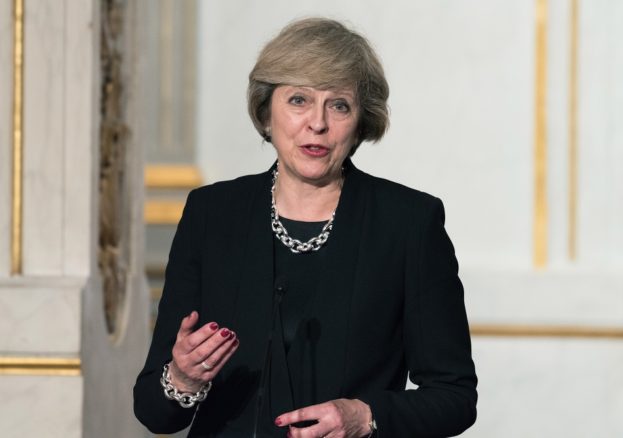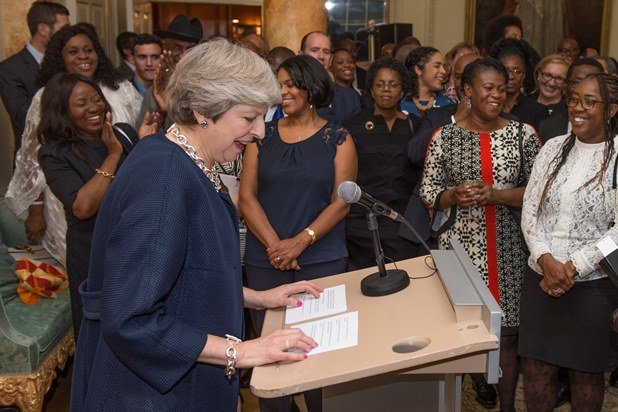
The first generation of Windrush arrivals were able to buy their own homes, enabling them to generate relative accumulative wealth, security for their children, and prosperity. What plans, and policies do you have in place for young people today to be able to do the same?
On my first day as Prime Minister, I set out how I want to see this country working for everyone – a country where, regardless of where you live or what your parents do for a living, you have a fair chance to build a life for yourself and your family.
Youth unemployment is down by 20% since 2010, more 18 year-olds are going to university than ever before, we’ve raised the amount people can earn before they pay back their student loan, and we’re introducing new T-Levels so people have gold standard qualifications whether they want to go to university or not.
But I know that one of the biggest worries for the younger generation is about getting on the housing ladder. We are building more homes, helping people with schemes like Help to Buy, and last Autumn we scrapped stamp duty for four in every five first time buyers to help people get a home of their own.
In light of the recent Windrush scandal, there are many misunderstood conceptions about the right of abode in the UK as full British Citizens for the Windrush generation and their descendants. Are there now guidelines available for people from the Windrush generation who have had to return to their country of birth? What are the provisions in place to facilitate ease of return to the UK for these people?
It should never have been the case that people from the Windrush generation faced problems proving their status, and I remain deeply sorry for the distress this has caused some families. We have let you down, and we will do whatever it takes to end the anxieties you face.
In April, we announced further steps to enable the Windrush generation to acquire the status they should always have had – British citizenship – quickly, at no cost and with assistance through the process.
Anyone who came to this country before 1973 will be able to apply, without needing to provide definitive documentary proof of date of entry and of continuous residence. We have also waived the fee for any children of parents from the Windrush generation, who are in the UK and not yet British citizens, and who want to apply for naturalisation.
Put simply, anyone from the Windrush generation who wants to become a British citizen will be able to do so – and this also includes children of parents from the Windrush generation.

Commonwealth citizens who’ve left the UK can resume their residence here by obtaining a returning resident visa. And we’re making sure the visa rules are interpreted generously in respect of the Windrush generation, who have spent a considerable time in the UK and who may not have known they were forfeiting residence here when they left. Again, that application will be made available free of charge.
Equally, there are those of the Windrush generation who retired to another country but want to return to the UK temporarily as visitors to see friends and family. Those who qualify can apply for a visit visa free of charge, which is valid for 10 years.
Will the Windrush Generation and their descendants now be issued with British Passports with all its rights and privileges?
Yes – any Commonwealth citizen who arrived in the UK before 1973 and has lived here since then will be entitled to apply for British citizenship, free of charge. And the children of the Windrush generation who joined their parents before they turned 18 will also be able to apply for citizenship for free; and children born to the Windrush generation in the UK will be able to get free confirmation of their existing British citizenship if they need to do so.
The availability of Home Office’s micro centres and civil servants in key areas such as Brixton and Croydon as a facility for those wishing to regularise their right to stay in Britain is appreciated. Can we expect to see a comprehensive overhaul of the Home Office?
Sajid Javid made clear when he started in office that his department could expect to see an overhaul following the difficulties some people from the Windrush generation have faced.
The Home Office has now set up a dedicated team working with Commonwealth citizens who have lived in the UK a long time and are worried about their immigration status; and has also announced a Windrush Scheme to make it easier for individuals to access support and understand what is on offer.
The department has also made sure that caseworkers are on hand to help individuals build a picture of their lives in the UK, and work with other government departments to find their records, if helpful. We have also announced a call for evidence on compensation for those, including the Windrush generation, who have faced difficulties in establishing their status under the immigration system. This is an opportunity for anyone affected to tell us about their experience to help shape the compensation scheme – but people can also speak, in confidence, to Home Office staff and ask for help to resolve their case.
Historically, communications between the Windrush Generation and their descendants with the police have been tense. How do you propose to end this gridlock?
I know that there is sometimes a lack of trust between many Black and minority ethnic communities, and the police. I want to help to rebuild that trust and I am committed to making sure everyone is treated fairly by the justice system. That’s why as Home Secretary I made changes to improve the use of stop and search, and we are working to increase the diversity of our police workforce, as well as strengthen the police discipline and complaints processes. All of this will help to build trust and drive up confidence in policing across all communities.
More broadly, people from all communities need to have confidence that their individual needs will be understood and respected. I launched the Race Disparity Audit last October in order to shine a light on how people of different ethnicities are treated across public services by publishing data held by the Government. If these disparities cannot be explained they need to be changed. Britain has come a long way in spreading equality and opportunity, but there is more to do to build a country that truly works for everyone.
What is your message to the Windrush generation?
It’s very simple. I’m sorry for the distress that’s been caused and I am determined we will put this right. The Windrush generation are British. They helped to build a modern Britain. They are part of us and every aspect of our national life – from sport to business, to politics to music, literature and academia.
This year marks 70 years since some of the first arrived in the UK aboard the Empire Windrush and we have a chance to celebrate the enormous contribution that people from around the Commonwealth – and their children and grandchildren – have made to Britain over seven decades. Our culture has been enriched and our society has been made stronger because of the people who travelled here to build new lives in the UK.
I want to thank all those from the Windrush generation for their contribution and want them to know, Britain has always been – and will always be – their home.
